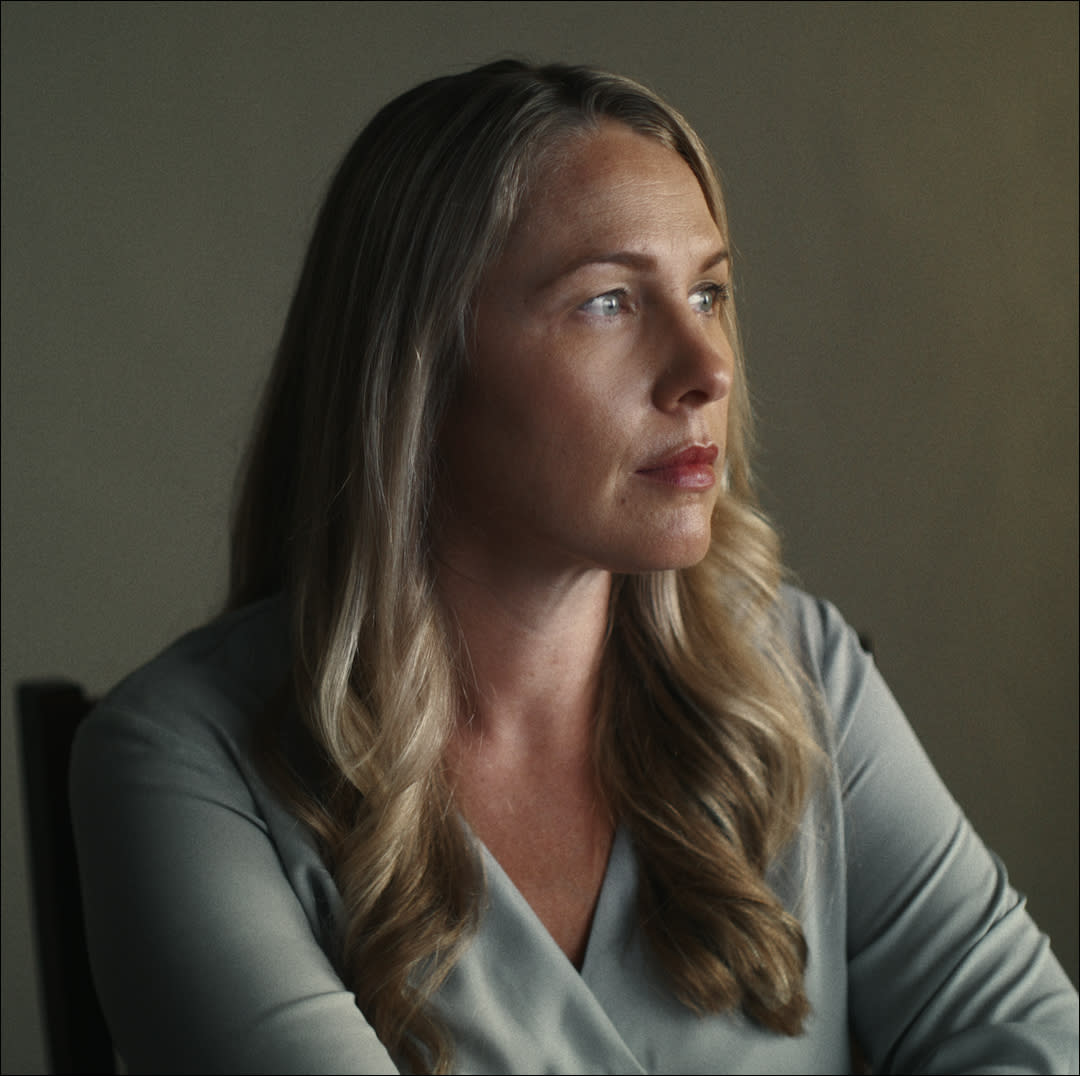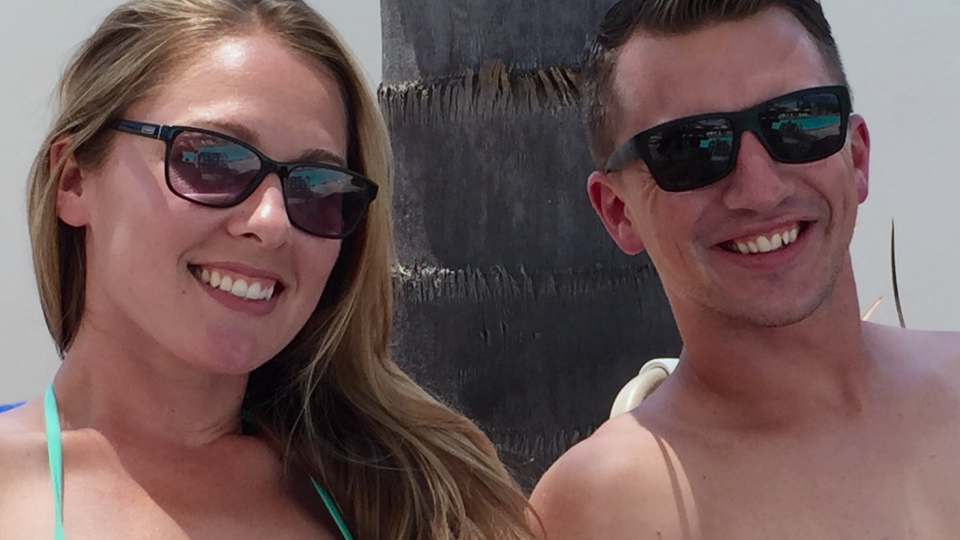The True Story Behind 'American Nightmare' and the So-Called 'Gone Girl' Case

Netflix's latest true crime series American Nightmare starts by laying out the details of a heinous crime: A woman is kidnapped from her boyfriend's home while he's tied up, drugged, and later sent a ransom. After a high-profile search throughout the San Francisco Bay Area, the woman turns up, seemingly unharmed, 400 miles away at her childhood home in the O.C. The police tell the world that the whole thing was made up, with the media comparing the case to the plot of Gone Girl. Except—spoiler alert—this is more a story of police misconduct than a ripped-from-fiction hoax.
The full story of Denise Huskins' 2015 kidnapping is now the subject of a three-part series from The Tinder Swindler filmmakers Felicity Morris and Bernadette Higgins, which quickly hit no. 1 on Netflix following its January 17 release. With the help of archival footage, interviews, and testimony from Huskins and her then-boyfriend Aaron Quinn themselves, American Nightmare details what happened when the police became more concerned with pinning the crime on its victims rather than achieving actual justice. Read on for a breakdown of the tragic events, and to learn where Huskins and Quinn are now after the whole ordeal.
Was Denise Huskins' kidnapping a hoax?

In the early hours of March 23, 2015, at least one unknown man entered the Vallejo, CA, home of Aaron Quinn, where he and his girlfriend Denise Huskins, 29, were sleeping. In the docuseries, the couple, who both worked as physical therapists, both recalled being awakened, bound, blindfolded, and sedated, at which point Huskins was taken outside and placed in the trunk of Quinn's car. Quinn was left in the house and given instructions to prepare to deliver a ransom. He was also warned that there was a camera monitoring his movements and if he contacted the police, the kidnappers would kill Huskins. Quinn passed out from the drugs, and several hours later, woke up, freed himself, and received two ransom demands via text for $17,000. Fearing he was putting Huskins’ life in danger, he reported the kidnapping to police.
The first episode of American Nightmare, which centers on Quinn's testimony on the ordeal, includes footage from Quinn's interrogation by Vallejo Detective Mathew Mustard, where it's clear that the officer did not believe his story. Mustard even suggests at one point that Quinn killed Huskins in a domestic violence dispute and disposed of her body. The interrogation went on for 18 hours before Quinn's brother hired an attorney to release him from police custody. During that time, the kidnappers tried to contact Quinn both by email and phone about the ransom, but police had put his phone on airplane mode.
In the second episode, Huskins recalls being held in a remote location by her kidnappers. She only interacted with one of the men, who told her that he was ex-military and part of a criminal group that included three other members. He also claimed that the intended targeting of the kidnapping was actually Quinn’s ex-fiancée Andrea, who had previously lived at Quinn's home and looked somewhat similar to Huskins. Over the 48-hour period, Huskins was raped twice by her captor while he videotaped the assaults, for use as blackmail in case Huskins told the police the truth about the kidnappers after her release. On March 25, Huskins was eventually released 400 miles away from Vallejo, near her childhood home where her parents still lived in Huntington Beach, CA.
In the hours after her release, the Vallejo police gave a press conference, where they said that they believed the couple made the story up and described the case as "an orchestrated event." Vallejo Police Lt. Kenny Park said at the time, "Mr. Quinn and Ms. Huskins has plundered valuable resources away from our community, and has taken focus away from the true victims of our community while instilling fear amongst our community members," adding that the couple "owe this community an apology" and that they may face criminal charges. Though Huskins cooperated with the police and went over the traumatic incident with them multiple times, both she and her lawyer Doug Rappaport recall in the docuseries that the police incessantly questioned her story, despite a rape kit corroborating that she had been assaulted. At one point, Rappaport recalls that when he pulled an officer aside and asked how they could not believe her, the officer replied, "Haven't you seen the movie Gone Girl?"
The media also ran with the comparison at the time, to the point that it was known as the "Gone Girl" case. The kidnapping victim now faced massive scrutiny from the public. "Those two days of captivity, all I wanted was to return to my life. All that for me through it was the thought of my future. And now that's all taken away," Huskins says in the doc.
Who kidnapped Denise Huskins?

The first crack in the police's claim that the kidnapping was a hoax came courtesy of a series of emails to The San Francisco Chronicle. Per the outlet, the sender claimed to be one of the kidnappers, and said that the whole ordeal was real and that they wanted to clear Huskins' name. The first message was sent before Huskins was released, and included a "proof of life" recording. Later emails included specific details about the kidnappings, and the sender mentioned other car thefts and home burglaries that they claimed the group had committed in the same neighborhood where Huskins was taken. The sender even sent one message after the press conference, demanding that the Vallejo police apologize to Huskins and Quinn.
Another break in the case came months later in June 2015, while police detective Misty Carausu was investigating an attempted kidnapping in of Dublin, CA, 40 miles south of Vallejo. The details of the incident were similar to Huskins and Quinn's case, except this time the couple thwarted the intruder, who dropped his phone as he escaped. For that crime, officers traced the phone and eventually arrested a former U.S. marine and disbarred Harvard-trained attorney named Matthew Muller. When they searched his home in South Lake Tahoe, they found evidence from Huskins' kidnapping, including a computer that Muller stole from Quinn's home and a lock of Huskins' blonde hair on a pair of duct-taped swimming goggles that she was forced to wear as a blindfold. As she made the connection to the highly-publicized case, Carausu became determined to get the evidence in front of investigators and clear Huskins' name. "They are calling this woman a liar on national TV, but I just wanted to reach through the computer, give her a hug, and say, 'I got you,'" she said in an interview for the docuseries.
The subsequent FBI investigation uncovered more evidence, including the videos of Muller sexually assaulting Huskins. In March 2017, Muller was sentenced to 40 years in prison by a federal court after pleading guilty to kidnapping for ransom. He also received a second sentence to 31 years in state prison in March 2022, after he pled guilty to the sexual assault of Huskins, robbery, burglary, and the false imprisonment of Quinn. While addressing the court in 2017, he said, "There’s nothing I can say. I’m sick with shame that my actions have brought such devastation. I hope my imprisonment can bring closure to Aaron and Denise and I’m prepared for any sentence the court imposes." Muller is currently serving his state sentence concurrently with the federal sentence.
Did the Vallejo Police Department ever give a public apology?
In March 2016, Huskins and Quinn filed a defamation lawsuit against the City of Vallejo and members of its police force, where they alleged that police failed to carry out a routine investigation and destroyed the couple's reputations, creating "a destructive nationwide media frenzy" by publicly accusing the couple of faking the crime. According to the lawsuit, the City of Vallejo privately sent a letter offering a "self-serving and halfhearted" apology after Muller’s arrest, but refused "to publicize this apology, opting rather to protect their own self-interest at the expense of the rights of these two innocent victims."
The lawsuit also argued that the couple were forced to move out of town due to the ordeal. "Instead of focusing on finding the true perpetrator … and protecting the community from a violent predator, defendants attacked plaintiffs and plaintiffs’ families, created a destructive nationwide media frenzy through public statements accusing plaintiffs of faking Denise’s kidnapping and rape, and rubbed salt in plaintiffs’ fresh wounds in the days and weeks following the attacks," it said.
In March 2018, Huskins and Quinn reached a settlement in the case, with the city agreeing to pay the couple $2.5 million. Three years later and six years after the incident, the city made a public apology in June 2021, admitting that the case "was not publicly handled with the type of sensitivity [with which] a case of this nature should have been handled." That same year, the couple published their tell-all book Victim F: From Crime Victims to Suspects to Survivors.
Where are Denise Huskins and Aaron Quinn now?

Huskins and Quinn stayed together in the aftermath of the tragic incident. They were married in 2018; Misty Carausu and the attorneys who defended them were guests at the ceremony, per ABC News. The couple's first daughter was born five years to the day that Huskins was released by her kidnapper, and they've since welcomed a second daughter, who is now one year old. Huskins has also opened up in interviews about the couple's healing journey, sharing that they went through therapy to "rebuild" their lives.
"You can go through any kind of trauma to where it leaves you devastated and in a place where you just think, 'This is impossible to move forward from. What do I do next?’" Huskins told ABC News in 2021. "I think ours is an example of that. There is hope. It might take time and it might be a lot of hard work, but there is hope."
In a recent Tudum interview, the couple (who are still married) added that they still don't have all the answers. However, they are still calling for accountability from law enforcement to do better.
"[Vallejo police] have the ability to do better. It’s almost like a blatant refusal to," Huskins says. [My story] fits a bigger theme of the confirmation bias, the tunnel vision, the lack of accountability [of law enforcement]. I think it’s a cultural thing that they are sadly getting in their own way, and at the expense of innocent victims."
"We don’t expect police to be infallible," Quinn adds. "We understand that mistakes will be made. Everyone makes mistakes — it’s the lack of correcting. And even more so the people above them not holding them [accountable]. It’s this whole system geared to protect itself over protecting the public, which is what they’re sworn to do."


